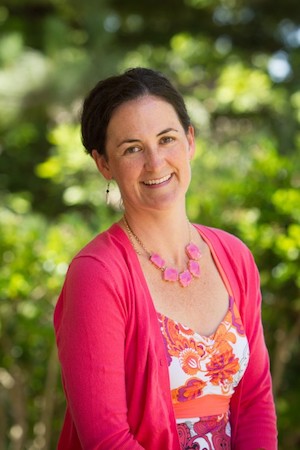Westmont Magazine Helping Children by Strengthening Families
Psychology professor Andrea Gurney seeks to treat entire families in her private clinical psychology practice.
 Treating a 4-year-old patient in a locked psychiatric unit led Andrea Gurney to broaden her specialty in child and adolescent psychology to include couples and families. “Seeing children with difficult and perplexing problems helped me realize I needed to work with parents to help kids,” she says. “So I started pulling parents and families into sessions with children.”
Treating a 4-year-old patient in a locked psychiatric unit led Andrea Gurney to broaden her specialty in child and adolescent psychology to include couples and families. “Seeing children with difficult and perplexing problems helped me realize I needed to work with parents to help kids,” she says. “So I started pulling parents and families into sessions with children.”
After earning a master’s degree at the University of Pennsylvania and a doctorate at Northeastern University in Boston, she completed a post-doctoral fellowship in couples and family therapy at Harvard Medical School.
“I purposely sought out a broad range of training so I’d be able to work with anyone who comes to see me,” she says.
Her diverse background includes counseling, as well as neuropsychological testing, with children, adolescents and adults in a variety of contexts. She has treated people in schools, inpatient units, outpatient clinics and individual homes.
She worked as a clinician at Boston Children’s Hospital (BCH) for nine years, scaling back to part time during her doctoral study, when she also taught classes at Northeastern. Her research drew on her clinical experience and her graduate work.
One study identified factors that help children develop resiliency: religious belief, social support and parenting style. Analyzing data from all economic levels revealed that minority families and children are unfairly labeled and stigmatized. The real risk factors, which include poverty and a difficult environment, affect people of all races.
During her post-doctoral fellowship, she worked for Cambridge Health Alliance, which is part of Harvard Medical School. “For three years, I did cutting-edge research with supervision by Harvard faculty members,” she says. “It provided excellent training, and it was a rich experience seeing such a variety of patients.”
Andrea grew up in New York and planned to stay on the East Coast, so she ignored potential jobs in California, including the one at Westmont. But when she visited campus, the professors and the program impressed her. Seeking to be obedient to God’s will, she joined the faculty in 2005. She wanted to combine teaching with clinical work, so the position fit her perfectly, requiring her to spend two-thirds of her time in the classroom and the other third in a clinical psychology practice. The position includes clinical work because seeing patients informs Andrea’s teaching and her ongoing research.
Three months after she arrived in Santa Barbara, Andrea met her husband, Thomas Hashbarger, an architect. They have two daughters, 4 and 2, which has given her new insights into parenting.
“I have a heart for clinical work in the community, and I love the variety of patients I see,” Andrea says. “They range in age from 7 to 70 and include newlyweds and long-married couples, families dealing with divorce, and parents struggling with child-raising. I’ve even seen three generations of one family.”
Andrea’s research focuses on attachment relationships in families as well as immigrant youth, inner-city youth, and families with children who are developmentally delayed. She continues to be interested in resiliency in children.
“I enjoy helping people find healthy, positive outcomes in the face of challenges, whether it be life transitions or severe stressors such as poverty or life-threatening medical issues,” she says.
She emphasizes the value of working with the entire family. “I can’t send a troubled teenager home until I’ve worked with the parents and dealt with family problems,” she says. “You can’t do justice to the individual if you ignore the family. It’s essential to look at the context and get a full picture.”
When Andrea talks to parents, she teaches them about children’s developmental stages so they understand what is happening with their kids. “Their brains aren’t fully developed yet,” she says. “Emotionality supersedes rationality, and that’s important for parents to understand.”
Andrea is working on a book about relationships that reflects her research and clinical practice. Using case studies, she discusses how people form attachments and what makes relationships strong and healthy. She hopes to reach a broad audience and will address issues such as parenting, marriage and divorce. She describes the content as “tips from a clinician about healthy relationships,” and she hopes the information will help strengthen families.